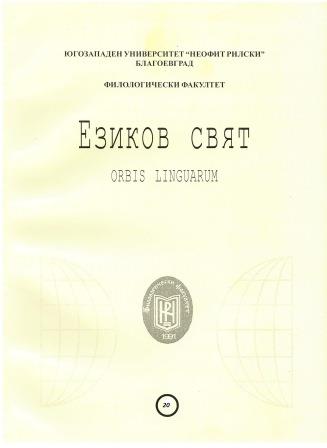ТРИ ИСТОРИЧЕСКИ ТЕРМИНА ЗА РОДСТВОТО: ПРАМАМА, ПРAТЪШТА, ПРАЩОУРА
THREE HISTORICAL KINSHIP TERMS: PRAMAMA (ПРАМАМА), PRATASHTA (ПРАТЪШТА), PRASHTOURA (ПРАЩОУРА)
Author(s): Mariyana Tsibranska-KostovaSubject(s): Language and Literature Studies, Theoretical Linguistics, Lexis
Published by: ЮГОЗАПАДЕН УНИВЕРСИТЕТ »НЕОФИТ РИЛСКИ«
Keywords: Slavonic historical kinship terminology; Slavic legal texts; distant kinship
Summary/Abstract: Three historical kinship terms attested in South Slavic legal texts of translated character are the subject of this article: pramama ‘great-grandmother‘; pratachta – a problematic term adapted to different contextual ambiance, but presumably designating the mother (stepmother) of the mother in law; prachtoura ‘great-granddaughter‘. They reveal a sustainable model of nomination, transmitted in the modern ways for linguistic expression of the more distant kinship. The word forming model of one-part cognate terms formed with prefixes пра or прѣ is historically productive, and retains its vitality from the past to the contemporary times. There are both established, commonly used and of high-frequency representatives, and rare ones. Although one can suppose the influence of the corresponding Greek term, respectively the attempt to calque it, the distant kinship provoked the use of a domestic fund, as the mentioned prefixes, which mark the temporal anteriority and the feature ‘old, aged’. It is not coincidental that in the traditional popular culture the expression “up to the ninth generation” implies the distant kinship. Distant kinship was obviously important in the times of the Ottoman domination, when the family played a major role in preserving identity. Positions in more distant genealogy were a challenge to the Slavic translators of Byzantine legal writings on the degrees of kinship from the late Middle Ages. They enriched the kinship terminology with new representatives.
Journal: Езиков свят - Orbis Linguarum
- Issue Year: 20/2022
- Issue No: 3
- Page Range: 319-324
- Page Count: 6
- Language: Bulgarian

